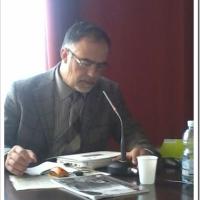Francesco Stella is a philologist, born 1962 in Fasano (BR, Italy) and living in Firenze. He studied Latin literature in Firenze and collaborated to the Thesaurus linguae Latinae at the Bavarian Academy of Sciences in Munich in 1987-88. From 1990 he is working at the University of Siena, teaching Medieval Latin Literature and Digital Philology.
As a medievalist, he mostly made researches about medieval Latin poetry and Carolingian culture: he edited some so far unknown medieval latin texts (such as De Ioseph of Sicardus Cremonensis, the anonymous De conditione mundi, the Liber Regum of ps. Hildebert, etc.), identified the authors of some unattributed works (such as the Karolus magnus et Leo papa and the IX century poem Spera coeli, the earliest historical witness about nocturlabium), published the first Italian translation and commentary of Audradus’ De fonte vitae (a IX century quest for a wisdom cup), Einhard’s Translatio Marcellini et Petri, Walahfrid’s Visio Wettini (earliest poetic vision of the hereafter), the Gesta Berengarii and Ysengrimus I book, and coordinated the SISMEL translation of Iacopo of Varazze's Legenda Aurea.
He also contributed a multi-volumes exploration of Biblical poetry from late antiquity to modern and contemporary poetry (the 1993 essay Poesia carolingia latina a tema biblico, the proceedings La Scrittura Infinita 1999-2001, etc.) and curated the first Italian anthology - with translations commentary - of Carolingian poetry (La poesia carolingia), some books, chapters and articles on poetry and theology in Medieval Latin, launching the interpretation of late antique Christian poetry as intercultural process and of medieval Latin literature as a second-language literature. Carrying on the activity of his predecessor I Deug-Su, he promoted the first edition of the Acta Processus in causa beatificationis Martyrum in Corea (1839-1856), together with Ahn Jae-Won and other collaborators, and the East-West research netwkork Global Latin. His latest publications are Il testo dell'immagine. Fonti letterarie per lo studio dell'arte medievale (Mondadori 2021) and Unconventional approaches to medieval Latin literature I The Carolingian Revolution II Digital philology and quantiative criticism (Brepols, 2020).
He directed a research project about the medieval university and the letter-writing in Arezzo (Lo Studium universitario di Arezzo nel '200), which brought to the publication of many unknown texts (such as Magister Guido Modi dictaminum by E. Bartoli, including the earliest teaching about love letters, the pre-humanist Geri’s Opera by C. Cenni, Guido the physician Liber mitis by P. Licciardello, Goro’s Grammatical rules by T. D'Alessandro, Bandini’s Liber Inferni by M. Gambineri, Mino da Colle’s Arezzo Letters by L. Menci, and others).
As a "digital" humanist, he directed the first digital critical edition of the multimedial corpus of the earliest Latin songs (www.corimu.unisi.it, Corpus Rhythmorum Musicum) and coordinated the largest Italian corpus of medieval Latin texts (it.alim.unisi.it), designing also a new software of textual comparison (Lexicon, developed by L. Tessarolo, including a lemmatizer of Medieval Latin), and publishing some essays on quantitative literary criticism. He is now leading the project Eurasian Digital Library, about collecting and analysing Latin texts from XIII to XVII century about China, Japan and Korea, and the project RAMMSES (Realtà aumentata del medioevo musicale a Siena e nel Senese).
As a comparatist, he founded and edited from 1986 on the journal Semicerchio. Rivista di poesia comparata and (1989) its Florence School of Creative Writing, also directing the series Poesia straniera for La Repubblica, the cd-rom Saper scrivere for L’Espresso and managing some European projects about translation and translation studies. He edited the first Italian books entitled to Interculture (1996) and to comparative metrics (Il verso europeo, 1995), and opened a field of comparative studies of the features common to Medieval and modern songs.
Over 18 of his projects have been approved and funded by regional, national, European and extra-European institutions from 1996 to 2020. Awarded with awards such as the Chaire Gutenberg (Strasbourg 2020) and the "Premio nazionale per la traduzione" of the Italian Ministry of Culture (2021), F . Stella is member of some scholarly societies, among them the Academia Europaea, the Accademia Colombaria, and SISMEL.
http://www.tdtc.unisi.it/personale/curriculum.asp?doc=Stella
